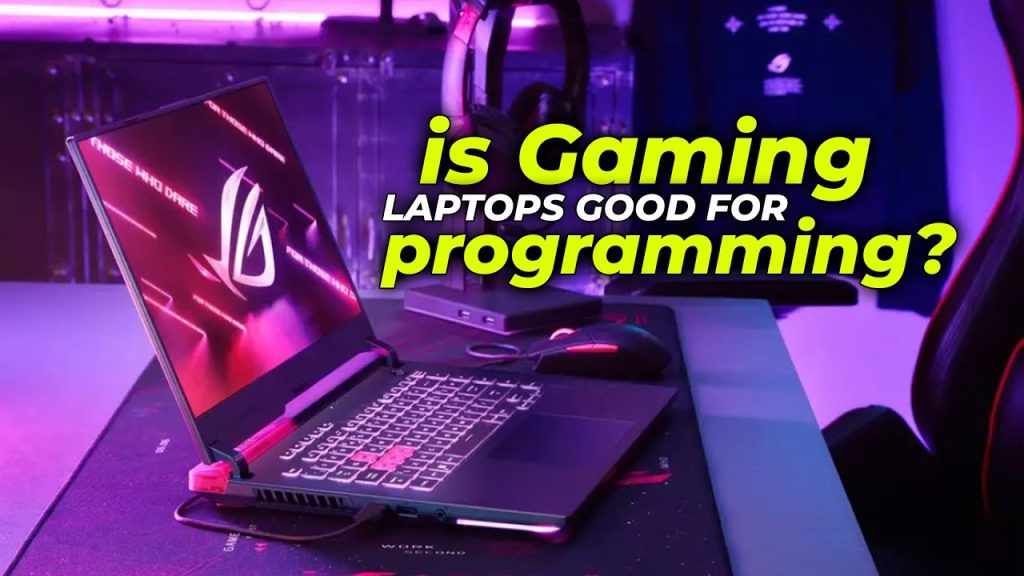
Absolutely! Gaming laptops can be great for programming. They’re designed to handle intense graphics and processing tasks, which also makes them excellent for running coding software and compiling code quickly. Plus, their powerful processors and ample RAM ensure a smooth multitasking experience when you’re working with multiple development tools or projects. Just make sure to consider factors like keyboard comfort and portability to find the best gaming laptop for your programming needs. In this article, we will discuss: Are Gaming Laptops Good for Programming? So keep reading!
Specs That Make Gaming Laptops Powerful
Gaming laptops are powerful machines designed to handle demanding gaming requirements. Here are the key specs that contribute to their power:
- Processor (CPU): Gaming laptops usually feature high-performance processors from brands like Intel or AMD. These processors have multiple cores and high clock speeds, allowing for smooth multitasking and fast code compilation.
- Graphics Card (GPU): A powerful GPU is a hallmark of gaming laptops. It’s essential for rendering complex graphics in games, but it can also be utilized for tasks like GPU-accelerated programming, simulations, and machine learning.
- RAM: Gaming laptops often come with ample RAM, typically ranging from 16GB to 32GB or more. Sufficient RAM is essential for running multiple applications simultaneously and handling memory-intensive tasks.
- Storage: SSDs (Solid State Drives) are commonly found in gaming laptops due to their speed and responsiveness. They contribute to fast boot times and quick loading of applications, including programming tools and IDEs.
- Display: Gaming laptops tend to feature high-refresh-rate displays with good color accuracy. While primarily for gaming visuals, these displays can enhance your coding experience by providing a smoother and more visually appealing workspace.
- Cooling System: Intensive gaming generates a lot of heat, so gaming laptops have robust cooling systems to prevent overheating. This feature benefits programming tasks that might also tax the system.
- Ports: Gaming laptops often have a variety of ports, including USB, HDMI, and sometimes even DisplayPort, allowing you to connect multiple peripherals and external monitors for enhanced productivity.
- Keyboard and Touchpad: Gaming laptops often have well-designed keyboards with customizable backlighting. A comfortable keyboard is crucial for programmers who spend extended hours typing. A precise touchpad is also beneficial for navigation.
- Build Quality: While not a technical spec, many gaming laptops are built with durability in mind to withstand the demands of gaming on the go. This can also translate to a longer-lasting laptop for programming tasks.
Remember that while gaming laptops are powerful, their design prioritizes performance over portability. Depending on your programming needs, you might also want to consider factors like weight, battery life, and the laptop’s overall form factor.
Why Programmers Need Powerful Laptops
Sure thing! Powerful laptops are like a secret weapon for programmers. They’re like supercharged machines that can handle all the tricky tasks that programmers do. When you’re writing code, your laptop needs to be quick and smart, just like you. It needs the power to run your code smoothly, even if it’s really complicated.
Think of it like a car engine – a more powerful engine can handle rough roads better. In the same way, a powerful laptop can smoothly run big programs, compile code lightning-fast, and even juggle different tools at the same time. So, it’s like having a trusty sidekick that makes your coding life easier and more efficient.
Potential Drawbacks of Gaming Laptops for Programming
Of course! While gaming laptops are strong allies for programmers, they have a few quirks to keep in mind. Imagine a cool sports car – it’s awesome, but not perfect for every road trip. Similarly, gaming laptops, although powerful, might be a bit heavier and bulkier. This can make them less comfortable to carry around, especially if you’re always on the move.
Also, they’re designed with flashy graphics and displays that make games look amazing, but these features might not be super essential for coding. Sometimes, you pay for stuff you won’t use much of.
And, gaming laptops tend to gobble up energy quickly. So, if you’re working unplugged a lot, you might need to stick close to a power socket.
Lastly, some gaming laptops can be a bit loud when they’re working hard, which might not be your favorite background noise while you’re in the coding zone.
But hey, like every choice, it’s about finding the right balance between power and what you actually need. Just like picking the right tool for the job – sometimes you need a hammer, sometimes you need a wrench!
Also Read: Beyond Specs: The Ideal Laptops to Boost Your Coding Efficiency
Conclusion
Absolutely! In conclusion, gaming laptops can be fantastic companions for programmers, offering the horsepower needed to tackle complex code and tasks. They bring power, speed, and the ability to multitask smoothly, which are essential for a productive programming experience. However, there are a few trade-offs to consider. Gaming laptops can be a bit heavier and bulkier, with features designed for gaming that might not be as useful for coding. They can also drain battery life faster and sometimes create a bit of noise.
Ultimately, the choice comes down to finding the right balance between power and practicality based on your specific needs. Just like a well-equipped toolbox, having the right laptop can make your programming journey smoother and more enjoyable.